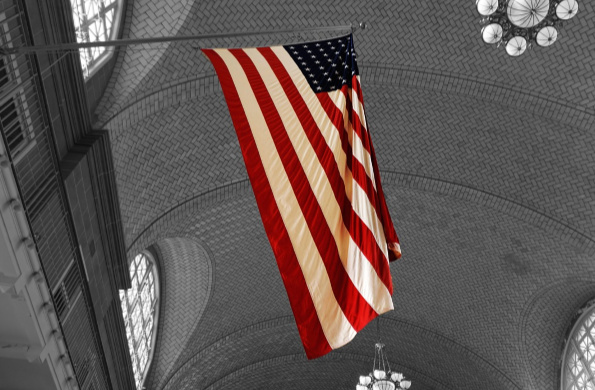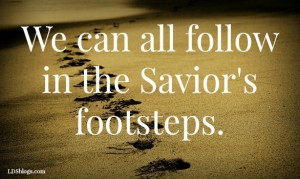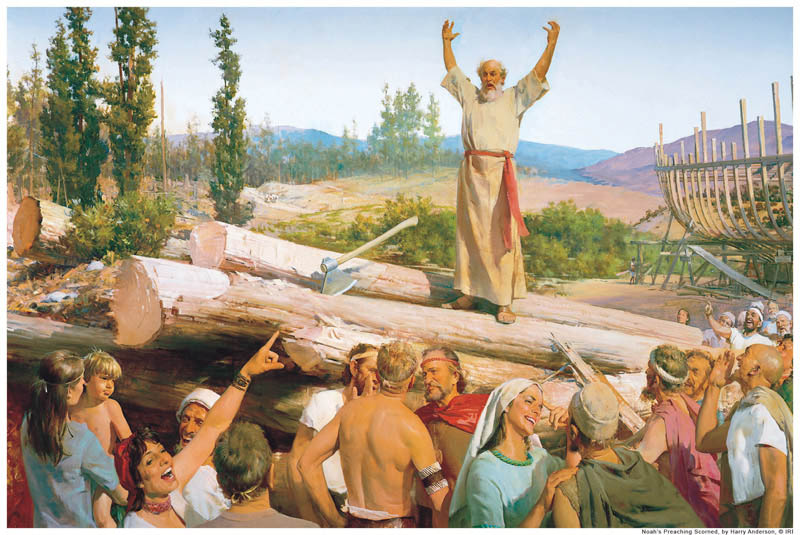I got a good laugh yesterday talking to a friend of mine. She was describing the differences she saw with her new family when she first got married. She described the day she met her in-laws for the first time. It was the 80s in Illinois and her mother-in-law kept checking out my friend’s hair. She thought she was admiring her new hairdo, but she wasn’t — she was looking for her Mormon horns! (*Cue belly laugh*) Her story reminded me of a memory I had from my childhood.
 I grew up in Illinois around that same time. When I was 7, I was invited over to have lunch with my friend’s family. Her dad was a Presbyterian minister and I remember her mom talking to my brothers and me about how we needed to join their church before our horns grew in.
I grew up in Illinois around that same time. When I was 7, I was invited over to have lunch with my friend’s family. Her dad was a Presbyterian minister and I remember her mom talking to my brothers and me about how we needed to join their church before our horns grew in.
They thought that my parents must file down their horns, but we were young enough to still be spared. I’m chuckling because if you knew my parents, that would seem beyond ridiculous. My dad went bald when he was 22 and has had a monk’s halo ever since. Hiding horns on a head like that would be nearly impossible!
Irish Refugees
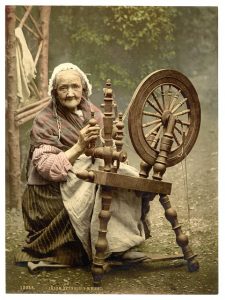 Along that same vein, I recently read about the persecution and bigotry the Irish settlers endured when they came to America. Most of Ireland is filled with farms, and back then the farmers sent a majority of their crops back to England. Their English landlords required their harvest for payment on the land, and the people only got to keep what they could grow in their own gardens.
Along that same vein, I recently read about the persecution and bigotry the Irish settlers endured when they came to America. Most of Ireland is filled with farms, and back then the farmers sent a majority of their crops back to England. Their English landlords required their harvest for payment on the land, and the people only got to keep what they could grow in their own gardens.
In fact, the English had imposed laws to punish the Irish Catholics. Called Penal Laws, they made it so the Irish Catholics were fined or imprisoned for practicing their religion. Their priests could be killed for leading any Catholic rites. Irish Catholics were banned from owning land, voting, holding public office, having religious items, teaching, or even publishing anything Catholic. They couldn’t even have a job, go to school, or claim guardianship of their own children.
So, with such difficult restrictions, it was no wonder that most Irish people were farmers back then. What else did they have? Most people lived on the potatoes and cabbage they could grow in the garden, so when a terrible potato blight hit Ireland, people starved. These Irish farmers had little choice but to find somewhere new to live. I mean, literally a million people starved to death in Ireland in the Great Potato Famine, which lasted from 1845 till 1852.
Irish differences
 A million more Irish people immigrated to the US in that time in a desperate bid to survive and build a new life. Those who were already settled in the US were intimidated and shocked by the massive numbers of immigrants. The Irish had a separate language (Gaelic), their communities were very tightly knit, and they were often decidedly Catholic while much of the US at the time was Protestant.
A million more Irish people immigrated to the US in that time in a desperate bid to survive and build a new life. Those who were already settled in the US were intimidated and shocked by the massive numbers of immigrants. The Irish had a separate language (Gaelic), their communities were very tightly knit, and they were often decidedly Catholic while much of the US at the time was Protestant.
Even their culture was different from their neighbors. Soon, signs began appearing in store windows “Help Wanted — Irish Need Not Apply.” They were charged higher fees for groceries and basic necessities, called “Irish prices.” People saw the Irish as lower class.
My great grandparents were among these settlers. I remember hearing how my grandfather showed up for a date one night only to be met by the girl’s father holding a shotgun. He was informed that he was to never see the girl again. He couldn’t see past their differences to recognize that my grandpa was a great guy. My family eventually settled in California because there was less anti-Irish sentiment and better chances for finding jobs.
Remember the Past
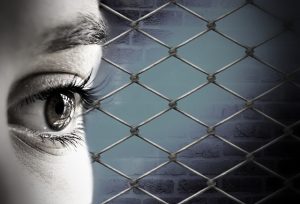 I use these two illustrations to introduce my topic because I think we have lost some perspective on our past. We see ourselves as much more enlightened than generations before us, yet we are still doing the same things. Only now it’s the Latino, Polynesian, or refugee immigrant populations that are targeted — at least near me, though you may find differently where you live. Fortunately there are laws now to ease some of the discrimination, but it’s still there in many hearts.
I use these two illustrations to introduce my topic because I think we have lost some perspective on our past. We see ourselves as much more enlightened than generations before us, yet we are still doing the same things. Only now it’s the Latino, Polynesian, or refugee immigrant populations that are targeted — at least near me, though you may find differently where you live. Fortunately there are laws now to ease some of the discrimination, but it’s still there in many hearts.
I have been very blessed to have a beautiful aunt who married a Polynesian man. They had eight kids, and my cousins bring flavor and flair to my life. I can’t imagine a world without them. And even though I don’t see them as often as I like, I always have happy memories of the times we get to spend together. The differences in our cultures adds beauty and fun to family gatherings. I admire and deeply love how much the family is protected and respected in both the Polynesian and Latin cultures, and I am deeply saddened when I witness others looking down on something they haven’t taken the time to understand.
Differences Are Blessings
 Let’s be honest: I doubt there is anyone left who thinks that members of the Church have horns. (They don’t, in case you missed that part.) But I do know there are still those who look at different cultures with disdain. Our world is diverse and, thanks to modern technology, we are able to interact more and more with different people.
Let’s be honest: I doubt there is anyone left who thinks that members of the Church have horns. (They don’t, in case you missed that part.) But I do know there are still those who look at different cultures with disdain. Our world is diverse and, thanks to modern technology, we are able to interact more and more with different people.
Do you know what I have found? I’ve found that we all have far more similarities than differences. We all love to eat — food is delicious! We like sleep and wish we had more of it. We love our families and want to be with them forever. We want to be comfortable and accepted for who we are. We want to have a place where we feel valued and loved.
Prophetic Counsel
Neal A. Maxwell asked us to celebrate our differences and treat others with love. He said:
“Your lives, your friendships, your marriages, your families, your neighbors and coworkers currently constitute the sample of humanity which God has given you. We are each other’s clinical material, and we make a mistake when we disregard that sober fact. No wonder, therefore, we feel stress at times. The wise and insightful President Brigham Young said this: “There are no two faces alike, no two persons tempered alike; … we are tried with each other, and large drafts are made upon our patience, forbearance, charity, and good will, in short, upon all the higher and Godlike qualities of our nature” (in Deseret News, 6 July 1862, 9).
To read more of Patty’s articles, click here.
Now, you are going to have days when people make a large draft on your patience, when they lay claim to your long-suffering that you may feel they don’t quite deserve. This is part of the chemistry that goes on in discipleship if we are serious about it, as we constitute each other’s clinical material.”
When we start looking at our similarities, the differences don’t matter as much. Language barriers can be overcome. Cultural differences can be celebrated. We are all children of the same God, and that God doesn’t make mistakes. I am so grateful for the diversity in our world and I pray we are able to treat others as God intended.
Patty thrives on all things creative. You’ll often find her in the garden pretending she is a suburban farmer. She loves meeting new people, and is devoted to her friends and family. In her heart she is a Midwesterner even though life has moved her all over the country. She believes in “blooming where you’re planted” and has found purpose in every place she has been. She has a deep and abiding love for the Savior and the Gospel of Jesus Christ. And she loves editing LDS Blogs because it is a constant spiritual uplift. Not many people can say their job builds their witness of the Savior.

